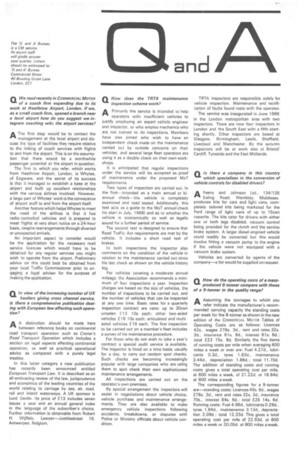Q How does the TRTA maintenance inspection scheme work?
Page 53

If you've noticed an error in this article please click here to report it so we can fix it.
APrimarily the service is intended to help
operators with insufficient vehicles to justify employing an expert vehicle engineer and inspector, or who employ mechanics who are not trained to do inspections. Members have also joined who wish to have an independent check made on the maintenance carried out by outside concerns on their vehicles, and several large fleet operators are using it as a double check on their own workshops.
It is anticipated that regular inspections under the service will be accepted as proof of maintenance under the proposed MoT requirements.
Two types of inspection are carried out. In
the first intended as a main annual or biannual check—the vehicle is completely examined and road tested. Additionally, this test acts as a guide to the MoT annual check (to start in July, 1968) and as to whether the vehicle is economically as well as legally sound for a further period of service.
The second test is designed to ensure that Road Traffic Act requirements are met by the vehicle. It includes a short road test of brakes.
In both inspections the inspector also comments on the condition of the vehicle in relation to the maintenance carried out since his last check as shown on the vehicle history log.
For vehicles covering a moderate annual mileage the Association recommends a minimum of four inspections a year. Inspection charges are based on the site of vehicles, the number of inspections to be carried out, and the number of vehicles that can be inspected at any one time. Basic rates for a quarterly inspection contract are vans: up to 30cwt unladen £13 10s each: other two-axled vehicles £16 1 Os each; articulated and multiaxled vehicles £19 each. The first inspection to be carried out on a member's fleet includes a survey of his maintenance procedure.
For those who do not wish to take a year's contract a special audit service is available. The inspector is hired on a time basis, usually for a day, to carry out random spot checks. Such checks are becoming increasingly popular with large companies who are using them to spot check their own sophisticated maintenance arrangements.
All inspections are carried out on the operator's own premises.
By special arrangement the inspectors will assist in negotiations about vehicle choice, vehicle purchase and maintenance arrangements. They are also available to make emergency vehicle inspections following accidents, breakdowns, or disputes with Police or Ministry officials about vehicle condition. TRTA inspectors are responsible solely for vehicle inspection. Maintenance and rectification of faults found rests with the operator.
The service was inaugurated in June 1966 in the London metropolitan area with two inspectors. There are now four inspectors in London and the South East with a fifth starting shortly. Other inspectors are based at Glasgow, Birmingham, Leeds, Sheffield, Liverpool and Manchester. By the autumn inspectors will be at work also at Bristol/ Cardiff, Tyneside and the East Midlands.












































































































